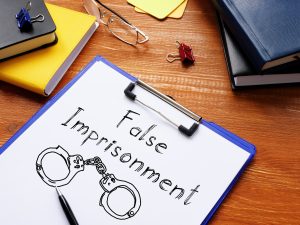Unfortunately, there are times when people are falsely arrested, whether intentionally or simply by a mistake in identity. When that does happen, there is a potential for a personal injury claim for false arrest and false imprisonment to be made arising out of that false arrest. In Alabama, false arrest and false imprisonment, while seemingly very similar, are slightly distinguishable. For instance, false imprisonment in Alabama is statutorily defined, as “the unlawful detention of the person of another for any length of time…” Ala. Code § 6-5-170. Conversely, Alabama courts have long held that to constitute an arrest, as person must be taken into custody under real or assumed authority. Davis & Allcott Co. vs. Boozer, 110 So. 28, 29 (Ala. 1926). Accordingly, if a person has been subject to a false arrest, that false arrest will also support a claim for false imprisonment. In that instance, the first question that must be answered is whether the arrest that was made was in fact “false,” and if the answer is no, i.e. the arrest was made pursuant to a valid warrant, then there can be no subsequent action for a false arrest or false imprisonment. Assuming that the arrest was in fact “false,” that leads to a more difficult question to answer: “is the police officer ultimately immune from liability for the false arrest?”
In Alabama, law enforcement officers are granted State-agent immunity under Alabama Code section 6-5-338(a). This statute states that law enforcement officers “shall have immunity from tort liability arising out of his or her conduct in performance of any discretionary function…” Ala. Code § 6-5-338(a). After the legislature enacted the State-agent immunity statute, there were circumstances arising that raised the question of what qualified as a “discretionary function.” The Supreme Court of Alabama addressed that particular issue in Ex parte Cranman when it set out the restatement of the State-agent immunity and provided the test in determining whether a law enforcement officer would be entitled to State-agent immunity under section 6-5-338(a). The Cranman Court Stated:
A State agent shall be immune from civil liability in his or her personal capacity when the conduct made the basis of the claim against the agent is based upon the agent’s
- formulating plans, policies, or designs; or
- exercising his or her judgment in the administration of a department or agency of government, including, but not limited to, examples such as:
- making administrative adjudications;
- allocating resources;
- negotiating contracts;
- hiring, firing, transferring assigning, or supervising personnel; or
- discharging duties imposed on a department or agency by statute, rule, or regulation, insofar as the statute, rule or regulation prescribes the manner for performing the duties and the State agent performs the duties in that manner; or
- exercising judgment in the enforcement of the criminal laws of the State, including, but not limited to, law-enforcement officers’ arresting or attempting to arrest persons; or
- exercising judgment in the discharge of duties imposed by statute, rule, or regulation in releasing prisoners, counseling or releasing persons of unsound mind, or educating students.
Notwithstanding anything to the contrary in the foregoing statement of the rule, a State agent shall not be immune from civil liability in his or her personal capacity.
- When the Constitution or laws of the United States, or the Constitution of this State, or laws, rules, or regulations of this State enacted or promulgated for the purpose of regulating the activities of a governmental agency require otherwise; or
- when the State agent acts willfully, maliciously, fraudulently, in bad faith, beyond his or her authority, or under a mistake interpretation of the law.
792 So. 2d 392, 405 (Ala. 2000). As it relates to claims of false arrest and false imprisonment, under Cranman a law officer is entitled to State-agent immunity if, at the time of the false arrest her or she was, “exercising judgment in the enforcement of the criminal laws of the State… including… arresting or attempting to arrest persons.” Since Cranman, the Alabama courts have been clear that generally, when a law enforcement officer is conducting an arrest, that conduct is considered an exercise of a discretionary function which entitles the officer to State-agent immunity. Swan v. City of Hueytown, 920 So. 2d 1075 (Ala. 2005). Like anything else, however, there are exceptions.
 Importantly, for a law enforcement officer to be granted State-agent immunity when conducting an arrest, the underlying arrest must be lawful. If the underlying arrest is unlawful, then the conduct would not be considered a discretionary function as the law enforcement officer would have no discretion in effectuating the arrest. For example, in Telfare v. City of Huntsville, the plaintiff was arrested for a misdemeanor that was not committed in the arresting officer’s presence which is requirement for misdemeanors under Alabama Rule of Criminal Procedure 4.1(a)(1). 841 so. 2d 1222, 1228 (Ala. 2002). As such, the plaintiff in Telfare argued that because the arresting officer lacked the lawful authority to arrest her, the arresting officer was not engaged in a discretionary function and, therefore, was not entitled to State-agent immunity. Id. On appeal, the Supreme Court of Alabama held, “[b]ecause there is no evidence in the record tending to show that Officer McCarver was pursuing a discretionary function, i.e., was effectuating a lawful arrest, the City has failed to demonstrate that it is entitled to immunity.” Id. at 1229.
Importantly, for a law enforcement officer to be granted State-agent immunity when conducting an arrest, the underlying arrest must be lawful. If the underlying arrest is unlawful, then the conduct would not be considered a discretionary function as the law enforcement officer would have no discretion in effectuating the arrest. For example, in Telfare v. City of Huntsville, the plaintiff was arrested for a misdemeanor that was not committed in the arresting officer’s presence which is requirement for misdemeanors under Alabama Rule of Criminal Procedure 4.1(a)(1). 841 so. 2d 1222, 1228 (Ala. 2002). As such, the plaintiff in Telfare argued that because the arresting officer lacked the lawful authority to arrest her, the arresting officer was not engaged in a discretionary function and, therefore, was not entitled to State-agent immunity. Id. On appeal, the Supreme Court of Alabama held, “[b]ecause there is no evidence in the record tending to show that Officer McCarver was pursuing a discretionary function, i.e., was effectuating a lawful arrest, the City has failed to demonstrate that it is entitled to immunity.” Id. at 1229.
Another circumstance that would remove the cloak of State-agent immunity from the offending police officer is if the officer acted beyond his or her authority in effectuating the arrest. For instance, suppose that a municipal police force has rules, regulations, and/or detailed checklists that a police officer is required to follow prior to arresting an individual on an alleged outstanding warrant. The rules, regulations, and/or detailed checklists may require that the arresting officer gather further information to confirm the outstanding warrant is indeed valid, such as contacting the jurisdiction where the warrant is outstanding to confirm the name, date of birth, and/or social security number of the person to which the warrant is issued matches the suspect. Assuming such rules, regulations, and/or checklists exist, if a police officer were to arrest a person just upon hearing that there may be a possible warrant for that person, and the officer fails to follow the rules, regulations, and/or detailed checklists, the arresting officer would not be protected under State-agent immunity, as that officer would have been acting “beyond his or her authority” in effectuating the arrest. See Giambrone v. Douglas, 874 So. 2d 1046, 1052 (“A State agent acts beyond authority and is therefore not immune when he or she ‘fails to discharge duties pursuant to detailed rules or regulations, such as those stated on a checklist'”)(quoting Ex parte Butts, 775 So. 2d 173, 178 (Ala.2000)). To further illustrate such a potential exception, we can look to the Alabama Supreme Court’s decision in Swan v. City of Hueytown.
 In Swan, a police officer for the City of Hueytown stopped a vehicle in which the plaintiff, Michael Swan, was a passenger. 920 So. 2d 1075 (Ala. 2005). While conducting the stop, the officer radioed dispatch to search for any potential outstanding warrants for Michael Swan. Id. After the dispatcher told the officer that there was a potential warrant for Swan, the officer instructed the dispatcher to gather more information and contact the jurisdiction that had the outstanding warrant. Id. The dispatcher then informed the officer that the jurisdiction had confirmed the existence of the warrants for Swan’s arrest. Id. The officer then arrested Swan. However, the evidence later indicated that the outstanding warrants were for “Michael Swann” rather than the “Michael Swan” that was arrested. Id. The Alabama Supreme Court was later tasked with analyzing whether the arresting officer was subject to State-agent immunity. In reaching its conclusion that the arresting officer was in fact immune from liability, the Swan Court relied heavily on the fact that the arresting officer took extra steps to confirm the existence of the warrant prior to arresting the individual. Id. However, in the example above, had the arresting officer been required to follow detailed rules and regulations, such as taking those steps to confirm the validity of the warrant, and he or she did not take those steps prior to arresting the individual, then the officer would not be granted State-agent immunity as the officer would have been acting beyond his authority.
In Swan, a police officer for the City of Hueytown stopped a vehicle in which the plaintiff, Michael Swan, was a passenger. 920 So. 2d 1075 (Ala. 2005). While conducting the stop, the officer radioed dispatch to search for any potential outstanding warrants for Michael Swan. Id. After the dispatcher told the officer that there was a potential warrant for Swan, the officer instructed the dispatcher to gather more information and contact the jurisdiction that had the outstanding warrant. Id. The dispatcher then informed the officer that the jurisdiction had confirmed the existence of the warrants for Swan’s arrest. Id. The officer then arrested Swan. However, the evidence later indicated that the outstanding warrants were for “Michael Swann” rather than the “Michael Swan” that was arrested. Id. The Alabama Supreme Court was later tasked with analyzing whether the arresting officer was subject to State-agent immunity. In reaching its conclusion that the arresting officer was in fact immune from liability, the Swan Court relied heavily on the fact that the arresting officer took extra steps to confirm the existence of the warrant prior to arresting the individual. Id. However, in the example above, had the arresting officer been required to follow detailed rules and regulations, such as taking those steps to confirm the validity of the warrant, and he or she did not take those steps prior to arresting the individual, then the officer would not be granted State-agent immunity as the officer would have been acting beyond his authority.
Since Cranman and its progeny, the issue of State-agent immunity remains hotly contested. As with a lot of areas of the law, the question of whether a law enforcement officer is entitled to State-agent immunity based on their conduct can be a complex and multifaceted inquiry. As such, should you or your loved ones find yourselves in a situation where you believe you may have been wrongfully or falsely arrested, it is critical that you consult with a competent attorney like the attorneys at Hollis Wright. Here at Hollis Wright we stand ready to fight for you. You can contact us here or at 844.LAW.TALK or 205.324.3600.
 Alabama Injury Law Blog
Alabama Injury Law Blog


